Realising the potential of engineering biology through the Earlham Biofoundry
Engineering biology has been identified as a critical technology for the UK. Biofoundries will be critical for those hoping to make an impact in this emerging field.
On the 16 April, Dr Carolina Grandellis, Manager of the Earlham Biofoundry, gave oral evidence to The House of Lords Science and Technology Committee’s inquiry into engineering biology.
The UK’s biofoundries — high-throughput robotic DNA and organism engineering facilities— have a key role in delivering the vision for engineering biology. But, as the Committee heard, they require greater and longer-term investment to be internationally competitive.
The Science and Technology Framework set out the Government’s approach to making the UK a science and technology superpower by 2030. Five technologies have been identified as ‘critical’ to achieve the UK’s goals and vision for science and technology: superconductors, artificial intelligence, future telecommunications, quantum technologies and engineering biology.
In April 2024, The House of Lords Science and Technology Committee launched an inquiry into engineering biology to better understand which technologies fall under this umbrella, and their potential to deliver UK economic growth.
The Earlham Institute, together with partners on the Norwich Research Park, submitted written evidence to the inquiry highlighting its expertise in the fundamental sciences that underpin engineering biology.
This includes genomics, computational modelling, chemistry, biochemistry, pharmacology and molecular genetics - as well as the role of the Earlham Biofoundry in supporting a number of start-up companies in engineering biology.
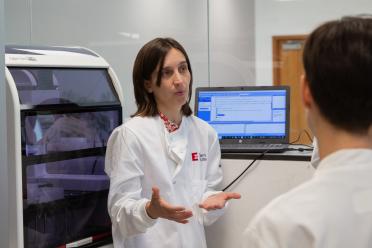
Dr Carolina Grandellis, was invited as an expert witness to the Committee’s first evidence session for its inquiry into engineering biology.
Thanks to its strategic funding from BBSRC, the Biofoundry exists as a National Bioscience Research Infrastructure housed within the Earlham Institute.
“The Earlham Biofoundry is designed to offer the UK bioscience and biotechnology communities a range of expertise in engineering biology,” says Carolina.
“We specialise in the rapid design, construction, and testing of biological systems while also offering access to automated platforms and workflows.”
Carolina was joined by Professor Paul Freemont, Co-Director of the Innovation and Knowledge Centre for Synthetic Biology (SynbiCITE) and Professor Susan Rosser, Co-Director at the Edinburgh Genome Foundry.
In this session, the Committee explored why engineering biology should be a priority for the UK, the role of the UK’s biofoundries in enabling engineering biology, and how the Government can best support them.
“Carolina spoke to the Committee about several crucial difficulties affecting the UK’s biofoundries – such as talent recruitment and retention, and long-term funding," says Saskia Hervey, Head of Public Affairs at the Earlham Institute.
"We hope to see these issues reflected in the Committee’s report and recommendations to the next government after the General Election.”
To help Committee members understand the breadth of engineering biology applications, Carolina described some of the ongoing projects at the Earlham Biofoundry.
“In partnership with biotechnology companies, the Biofoundry is engineering microorganisms to produce sustainable dyes for the textile industry and using precision fermentation to produce an alternative to palm oil, the most widely consumed vegetable oil on the planet,” she explained.
The Biofoundry also works with academics across the Norwich Research Park on a wide variety of projects, such as the biosynthesis of anti-cancer peptides in bacteria using synthetic biology - in collaboration with researchers at the John Innes Centre.
Another important example of the type of activity that can be carried out at biofoundries is high throughput testing.
As Carolina pointed out to the Committee, "biofoundries offer the possibility of processing thousands of samples daily, crucial during crises such as a global pandemic."

“Without more investment, the UK is at risk of losing its competitive edge in this area,” Saskia explains. “To keep pace with biofoundries established in Asia, the USA, the EU and Australia, we need significantly larger investments and strategic commitments.”

Saskia Hervey, Head of Public Affairs
When the Committee posed questions about the ways in which the Government should support biofoundries, the expert panel agreed there is a need for long-term funding to maintain the existing infrastructure and skilled staff.
Since the initial investment to equip the biofoundries in 2014, there have only been small, short-term funding opportunities which has led to a loss of talent and dispersion of expertise.
“Without more investment, the UK is at risk of losing its competitive edge in this area,” Saskia explains.
“To keep pace with biofoundries established in Asia, the USA, the EU and Australia, we need significantly larger investments and strategic commitments.”
Carolina reiterated this sentiment to the Committee. “Funding calls for engineering biology projects have been irregular and short-term," she said, "which makes it very difficult to plan the activities and to train the staff to work in biofoundries.”
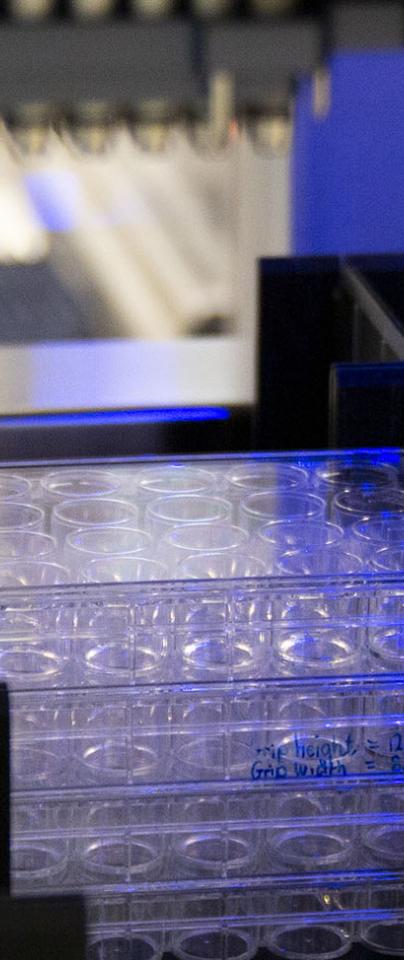

It is crucial to secure the funding that specifically enables collaboration with start-ups and small to medium-sized enterprises that lack the resources to fully take advantage of the capabilities of biofoundries.

Dr Carolina Grandellis, Earlham Biofoundry Manager
The Committee heard from the other witnesses how the US and China are investing millions of dollars in biofoundries to scale up the biomanufacturing of chemicals, food, materials and advanced biotherapeutics.
“It's crucial to secure the funding that specifically enables collaboration with start-ups and small to medium-sized enterprises that lack the resources to fully take advantage of the capabilities of biofoundries,” Carolina says.
"Such targeted funding will help develop start-ups and grow the UK biotech ecosystem."
Another key point that was raised during the session was the importance of attracting and retaining skilled staff. In addition to investing in doctoral training centres for the next generation of engineering biologists, talent from outside the UK must be recruited.
“Recruitment has been threatened by anti-immigration rhetoric and visa restrictions post-Brexit,” Saskia says.
“The Government has added an unnecessary burden of restrictions and additional costs, potentially putting international researchers off coming to the UK.”
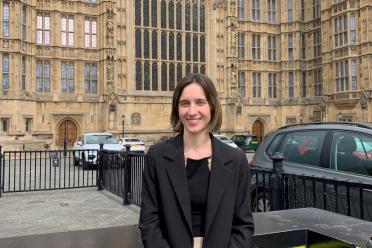
Carolina came from Argentina seven years ago to develop her career and is raising her young family in the UK. She is concerned the Government’s immigration restrictions may be deterring international colleagues from pursuing career opportunities in the UK.
“I advocate for diversity, which brings not only cultural value but also offers novel perspectives that can support more creativity, better innovation, and a more dynamic and productive environment; we risk losing all of these benefits if legal migration is further restricted,” she says.
“We're already receiving fewer applications from international researchers which is damaging the Government’s science superpower ambitions,” Saskia warns.
Potential further restrictions on international students may prevent the next generation of researchers from choosing the UK to study or as a base to contribute to the field of engineering biology.
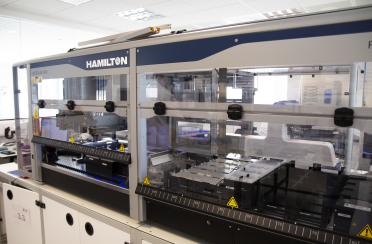
The Hamilton liquid handling system
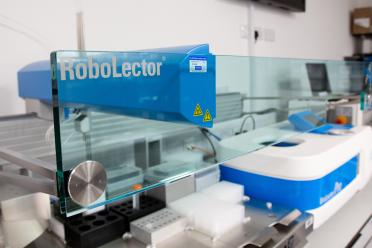
The RoboLector BioLector microfermentation platform
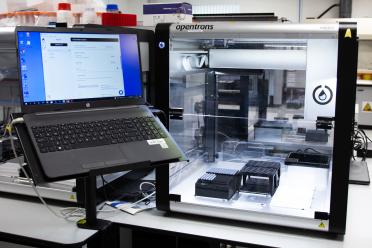
Opentrons platform suited for smaller scale experiments
The Genetic Technology (Precision Breeding) Act 2023 was introduced to the House of Commons in 2022 and received Royal Assent on 23 March 2023.
The Act was welcomed enthusiastically by the bioscience community as it will provide a pathway to market for engineering biology innovations in sustainable agriculture and food production.
The implementation of the Act, however, requires secondary legislation that must be passed by both Houses of Parliament. The timing of the General Election has already delayed this new law from bringing new products to market.
Carolina made the case for urgent implementation. and the Earlham Institute will urge the next Government to prioritise the secondary legislation early in the next Parliament.
Any further delays will disincentivise much-needed commercial investment in agritech solutions and increase the risk that products developed in the UK, using precision breeding technologies, will be marketed elsewhere.
Reflecting on the experience of providing oral evidence, Carolina says: “I felt the Committee recognised the importance of our work, as well as our concerns.
“I hope the Committee’s recommendations to the next Government will enable a better landscape for UK biofoundries to thrive.”
Authored by Monica Hoyos Flight, writing for the Earlham Institute.